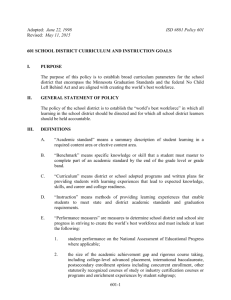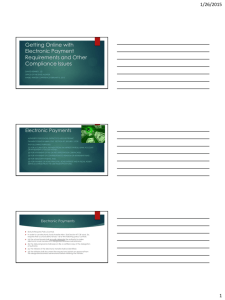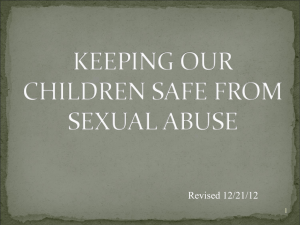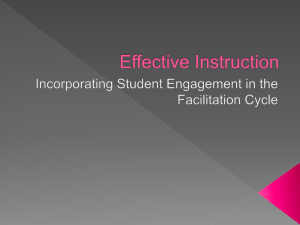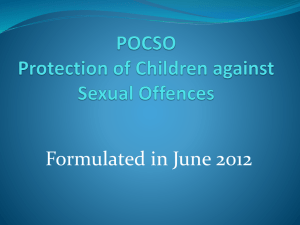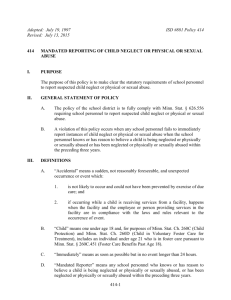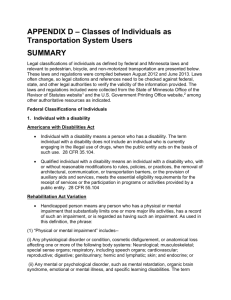Boundary Issues
advertisement
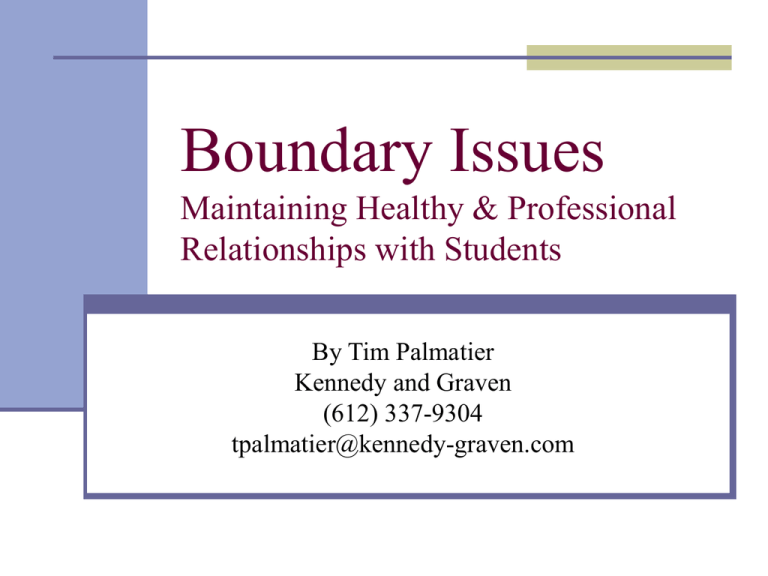
Boundary Issues Maintaining Healthy & Professional Relationships with Students By Tim Palmatier Kennedy and Graven (612) 337-9304 tpalmatier@kennedy-graven.com Defining Boundaries in TeacherStudent Relationships Relationship boundaries Emotional boundaries Power boundaries Financial boundaries Communication boundaries Expertise boundaries Personal boundaries The Educator’s “Fiduciary” Relationship A fiduciary relationship is “a special relationship in which one person accepts the trust and confidence of another to act in the latter’s best interest.” “In such a relationship the parties do not deal on equal terms. The fiduciary must act with the utmost good faith and solely for the benefit of the dependent party.” (Plaut 1993) Where there is a dual relationship (i.e. neighbor & teacher) the professional relationship controls Teacher Code of Conduct A teacher shall make reasonable efforts to protect the student from conditions harmful to health and safety A teacher shall disclose confidential information about individuals only when a compelling professional purpose is served or when required by law A teacher shall take reasonable disciplinary action in exercising the authority to provide an atmosphere conducive to learning A teacher shall not use professional relationships with students, parents, and colleagues to private advantage A teacher shall not knowingly make false or malicious statements about students or colleagues Selected Criminal Law Standards Minn. Stat. § 609.352: Solicitation of a Minor by Electronic Media Minn. Stat. § 626.556: Sexual or Physical Maltreatment Minn. Stat. § 617.23: lewd or lascivious behavior 18 U.S.C. 2252 – Material Involving the Sexual Exploitation of Minors School Policy Anti-Harassment Policy Other Policies Mandating Professional Conduct Within the School Environment Mandatory Reporting – Who? A person who knows or has reason to believe a child is being neglected or physically or sexually abused . . . or has been neglected or physically or sexually abused within the preceding three years, shall immediately report the information to the local welfare agency, agency responsible for assessing or investigating the report, police department, or the county sheriff if the person is: . . . a professional or professional's delegate who is engaged in the practice of the healing arts, social services, hospital administration, psychological or psychiatric treatment, child care, education, correctional supervision, probation and correctional services, or law enforcement Any person may voluntarily report known or suspected child abuse or neglect. Minn. Stat. § 626.556, subd. 3(b) Mandatory Reporting – What? Physical Abuse: Any physical injury, mental injury or threatened injury inflicted by a person responsible for the child’s care on a child other than by accidental means, or any physical or mental injury that cannot reasonably be explained by the child’s history of injuries, or any aversive or deprivation procedures, or regulated interventions, that have not been authorized under applicable law. Mandatory Reporting – What? Sexual Abuse: “Sexual abuse” means: a. The subjection of a child by a person responsible for the child’s care, by a person who has a significant relationship to the child, or by a person in a position of authority, to any act which constitutes criminal sexual conduct. Sexual abuse also includes any act involving a minor which constitutes a violation of prostitution offenses. Sexual abuse includes threatening sexual abuse. b. “Sexual contact” means touching of the child’s intimate parts or inducing the child to touch another person’s intimate parts. c. “Intimate parts” means genital area, groin, thighs, buttocks, or breasts, including the clothing covering such intimate parts. Mandatory Reporting – What? Neglect: failure by a person responsible for a child’s care to supply a child with necessary food, clothing, shelter, health, medical or other care required for the child’s physical or mental health when reasonably able to do so, failure to protect a child from conditions or actions which seriously endanger the child’s physical or mental health when reasonably able to do so, failure to provide necessary supervision or child care arrangements appropriate for a child, or failure to take steps to ensure that a child is educated in accordance with state law. Mandatory Reporting – What? Corporal punishment: Hitting or spanking a student with or without an object or the use of unreasonable physical force that causes bodily harm or substantial emotional harm are also maltreatment. Mandatory Reporting – What? The standard that triggers the mandatory reporting obligation is “reason to believe.” It does not require knowledge that a child has been abused or neglected. Mandatory Reporting -- Liability A mandatory reporter who knows or has reason to believe that a child is neglected or physically or sexually abused, or has been neglected within the preceding 3 years, and fails to report is guilty of a misdemeanor. Minn. Stat. § 626.556, subd. 6(a). A mandatory reporter who knows or has reason to believe that two or more children not related to the perpetrator have been physically or sexually abused by the same perpetrator within the preceding 10 years, and fails to report is guilty of a gross misdemeanor. Minn. Stat. § 626.556, subd. 6(b). Mandated and voluntary reporters are immune from civil or criminal liability that might result from their actions, if they are acting in good faith. Minn. Stat. § 626.556, subd. 4(a)(1). Mandatory Reporting -- Liability Any person who knowingly or recklessly makes a false report shall be liable in a civil suit for any actual damages suffered by the person or persons so reported, and for any punitive damages set by the court or jury, plus costs and reasonable attorneys’ fees. Minn. Stat. § 626.556, subd. 5. All school employees who permit access to children by an agency responsible for investigation or assessment in good faith are immune from civil or criminal liability. Minn. Stat. § 626.556, subd. 4(a)(3). Failure to comply with the requirements of the mandatory reporting law may be cause for discipline or termination of employment. Signs of Boundary Invasions Taking an undue interest in a student (i.e., having a "special" friend or a "special relationship" with a particular student). Giving gifts or money to the student for no legitimate educational reason. Engaging in peer-like behavior with students (i.e., being cool by being like one of the kids). Favoring certain students by giving them special privileges. Favoring certain students by inviting them to come to the classroom at non-class times. Getting the student out of class repeatedly to visit the teacher. Signs of Boundary Invasions Talking to the child about problems that would normally be discussed with adults (e.g., marital problems). Telling the student "secrets" and having "secrets" with the student. Talking to the child about the child's personal problems. Allowing the child to get away with inappropriate behavior. Being alone with the student behind closed doors at school. Taking the student on outings, away from protective adults. Signs of Boundary Invasions Giving students rides in the teacher's personal vehicle without administrative approval. Initiating or extending contact with students beyond the school day for personal purposes. Using e-mail, text-messaging, or websites to discuss personal topics or interests with students. Invading the child's privacy (e.g., walking in on the child in the bathroom, locker-room, asking about bra sizes, or previous sexual experiences). Going to the student's home for non-educational purposes. Signs of Boundary Invasions Taking the student on personal outings even with the parents' permission. Inviting students to the teacher's home without proper chaperones. Telling sexual jokes to students. Engaging in talk containing sexual innuendo or banter with students. Talking about sexual topics that are not related to curriculum. Showing pornography to the student. Prevention Avoid even the appearance of impropriety Recognize the limits of your position Team with other staff when providing personal assistance to students Don’t play favorites Link vulnerable students to professional assistance Staff recognition of personal vulnerabilities and need for professional assistance Self report questionable or uncomfortable interactions with students Support and guide fellow staff members Immediately Report suspected maltreatment and other questionable parent-staff interactions
